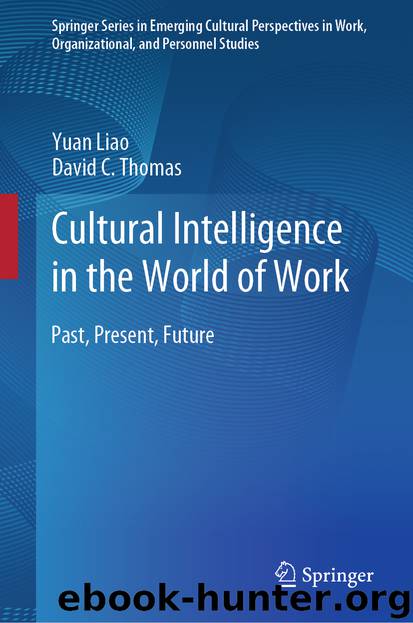Cultural Intelligence in the World of Work by Yuan Liao & David C. Thomas

Author:Yuan Liao & David C. Thomas
Language: eng
Format: epub
ISBN: 9783030181710
Publisher: Springer International Publishing
5.5 Summary
In summary, prior international experience and personality traits and skills that encourage people to seek out novel experiences and to manage complex environment are positively related to cultural intelligence. These findings are consistent with results from the broader literature of cross-cultural competence. For example, in a meta-analysis, Wilson, Ward and Fischer (2013) revealed that previous cross-cultural experience, length of residence, contact with host nationals, and language proficiency were associated with higher cross-cultural competence assessed by the Sociocultural Adaptation Scale reviewed in Chap. 1. Sociocultural adaptation was also related to all Big Five personality traits but the patterns seemed to differ to those with CQ. In particular, neuroticism (conversely emotional stability) seemed to have a larger correlation with sociocultural adaptation than with CQ, which may suggest that neuroticism is more relevant to the behavioral aspect of cross-cultural competence. Despite the empirical results, the theoretical links between personality traits and cross-cultural competence, CQ in particular, require further development (Wilson et al., 2013). Theories that depict the interactions between individuals and environment may provide some foundation. For example, Van der Zee and Van Oudenhoven (2013) clustered their multicultural personality traits into stress-related and social-perceptual traits. The former traits lower threat perception, protect people from culture shock, and help them refrain from sticking to one’s own culture, whereas the latter traits facilitate positive reactions, such as cultural learning and identifying with new culture, to challenges in intercultural situations. Both clusters of traits thus increase intercultural success. In a similar vein, future theoretical work on CQ development should concern personality traits that are conducive to cultural learning.
In terms of CQ training, both formal training and experiential learning showed some positive effects with a few exceptions, and the effects on the four sub-dimensions of CQS were inconsistent. The nature of the study designs makes it more difficult to draw clear conclusions from the results. First, most programs blended cultural knowledge with experiential learning components, making it difficult to partial out the effects of different training models. Second, many studies had a quasi-experimental, repeated measures design with a pre- and post-training CQ survey but without a control group or random assignment, which limited the possibilities of drawing a causal relationship between training and CQ change (Raver & Van Dyne, 2018). Future research should address these methodological weaknesses.
Experiential approaches to cross-cultural training embedded in programs that students identify as meaningful and significant seem to be more effective at energizing students to develop strategies specific to the cross-cultural situation they are facing as well as metacognitive strategies that can be useful in other cross-cultural settings (Mosakowski, Calic, & Earley, 2013). In some cases, participants’ CQS assessed prior to partaking in experiential education were negatively related to CQS development afterward, suggesting that cross-cultural training and education may serve as “experience equalizers,” allowing less culturally competent students to catch up with their more competent peers (Rosenblatt et al., 2013). No all cross-cultural experiences automatically translate to cultural intelligence though, as several studies reviewed above have revealed only by deeply engaging
Download
This site does not store any files on its server. We only index and link to content provided by other sites. Please contact the content providers to delete copyright contents if any and email us, we'll remove relevant links or contents immediately.
Rewire Your Anxious Brain by Catherine M. Pittman(17590)
Talking to Strangers by Malcolm Gladwell(11879)
The Art of Thinking Clearly by Rolf Dobelli(8843)
Mindhunter: Inside the FBI's Elite Serial Crime Unit by John E. Douglas & Mark Olshaker(7834)
Becoming Supernatural by Dr. Joe Dispenza(7107)
Change Your Questions, Change Your Life by Marilee Adams(6641)
The Road Less Traveled by M. Scott Peck(6635)
Nudge - Improving Decisions about Health, Wealth, and Happiness by Thaler Sunstein(6633)
The Lost Art of Listening by Michael P. Nichols(6474)
Enlightenment Now: The Case for Reason, Science, Humanism, and Progress by Steven Pinker(6406)
Win Bigly by Scott Adams(6312)
Mastermind: How to Think Like Sherlock Holmes by Maria Konnikova(6236)
The Way of Zen by Alan W. Watts(5800)
Daring Greatly by Brene Brown(5642)
Grit by Angela Duckworth(4738)
Big Magic: Creative Living Beyond Fear by Elizabeth Gilbert(4723)
Men In Love by Nancy Friday(4327)
Flow by Mihaly Csikszentmihalyi(4053)
The Four Tendencies by Gretchen Rubin(4024)
